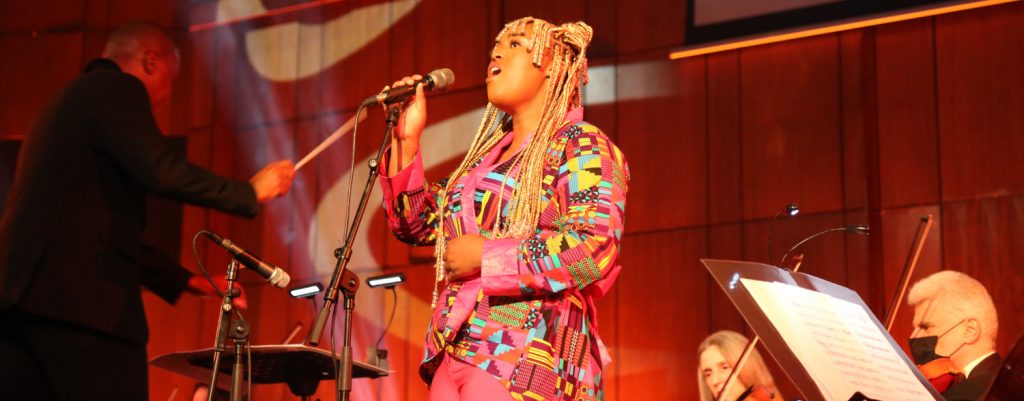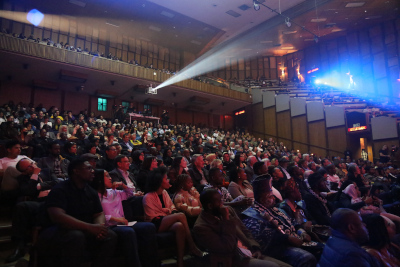Legendary maestro Pops Mohamed woos the audience with the magical harmonies from his kora.
The Linder Auditorium was abuzz with an evening that culminated into a powerful tool of music, dialogue and spoken word with a variety of performances from some of South Africa’s legendary and upcoming artists. The performers, who selflessly supported the ethos of the evening, acknowledged the plight of refugees and forcibly displaced people in South Africa and around the world. Perhaps most remarkable about the concert was the densely packed audience displaying cultural diversity, paying homage to one goal, unity and integration.
South African non-profit organisation Turquoise Harmony Institute (THI) hosted this year’s edition of its charity event in Johannesburg on August 12. The event aimed to bring to light the value of keeping our doors and hearts open to refugees, reminding us that we can offer them a chance to use their energy and talents in meaningful ways that ultimately benefit us all.
After a two-year hiatus, A Concert for Refugees was in no uncertain terms back on stage with a bang. Some of South Africa’s most celebrated musicians paid tribute to those who have fled conflict, violence and persecution in search of safety. The concert sought to draw attention to the plight of people who have been displaced from their homes, forgotten and misplaced by others and by circumstances out of their control, as well as to honour those who have overcome the challenges of being a stranger in another’s homeland.
 The star-studded series of high-profile artists at A Refugee Concert held in the Linder Auditorium included Msaki, who delivered a powerful performance. Photos: Supplied
The star-studded series of high-profile artists at A Refugee Concert held in the Linder Auditorium included Msaki, who delivered a powerful performance. Photos: Supplied
With music being the anthem of human solidarity, there is no doubt that the evening demonstrated exactly that. Artists included a star-studded series of high-profile appearances by Msaki, Sipho Hotstix Mabuse, PJ Powers, Thandi Ntuli, Pops Mohamed, Neill Solomon, South African poet Lebogang Mashile as well as Bienvenue Nseka (from the DRC) and Rocksteady Dub (from Mozambique) who collectively delivered unwavering energy.
The audience further enjoyed spoken word recitals by Lebo Mashile, collaborating with the magic of legendary Mohamed on the kora. The performance by Shalom Gumbo, a grade 5 learner with the Three2six schooling programme, was a powerful interpretation of unfeigned conviction of a poem by Sarah Lubula accompanied by Mohamed. His “Song for Women” speaking and interpreting spoken word through the kora, with heart and conviction, was an inspirational moment.
An emotionally charged performance by legendary singer, songwriter and composer, Solomon of “Can You Hear My Call” offered a quietly reflective moment to the evening. Powers brought the house down with electrifying performances of “Jabulani” and “Woman of Africa”. The formidable Mabuse treated the audience to “Village Ghetto Land” and “Refugee (Come Home)” ending the evening by setting the stage and audience alight with “Burnout”, all accompanied by the Mzanzi National Philharmonic Orchestra.
The Mzanzi National Philharmonic Orchestra delivered an emotionally rich sound throughout the evening. Full of elegance and grace and at times, even playful. Led by Maestro Kutlwano Masote with his energy and enthusiasm, a masterful performance all round.
The audience enjoyed the debut performance of a commissioned piece by icon Don Laka titled “Moon (We Shall Rise Again)” which was written for the KZN flood victims. The piece was elevated by the orchestra and the Ijadu chorus who delivered captivating vocals, a definite high point of the evening.
 The packed audience was a display of cultural diversity, paying homage to one goal, unity and integration.
The packed audience was a display of cultural diversity, paying homage to one goal, unity and integration. The evening from start to end filled the air with a spirit of connection and one thing is certain, it was a resounding success imbued with vibrations of consciousness, purpose, harmony and love — a genuine sense of humanity.
Emmanuel Taban and We-go Mutshipayi, who are refugees in South Africa, shared their stories with the audience. Taban was among the 100-most-influential people in Africa in 2020 and developed new treatment techniques during the pandemic.
Mutshipayi fled the conflict in the DRC and came to South Africa with his family as a child. He studies engineering at Wits University and teaches mathematics and science to grade 12 learners in Soweto through THI’s educational programme, Project Nelumbo.
The evening was made possible with the dedication of Ayhan Cetin, director of the Turquoise Harmony Institute and his invaluable team partnered with the Music In Africa Foundation, Nelson Mandela Foundation, Amnesty International, South Africa’s Department of Sports, Arts and Culture, Universal Rights Association, Wits University, Flame Studios, Horizon Educational Trust, The Mail & Guardian, Time to Care, Scalabrini Centre, JT Communication, the Southern African Music Rights Organisation, Concerts SA and Refugee Social Services.
Review by Taryn Warwirk